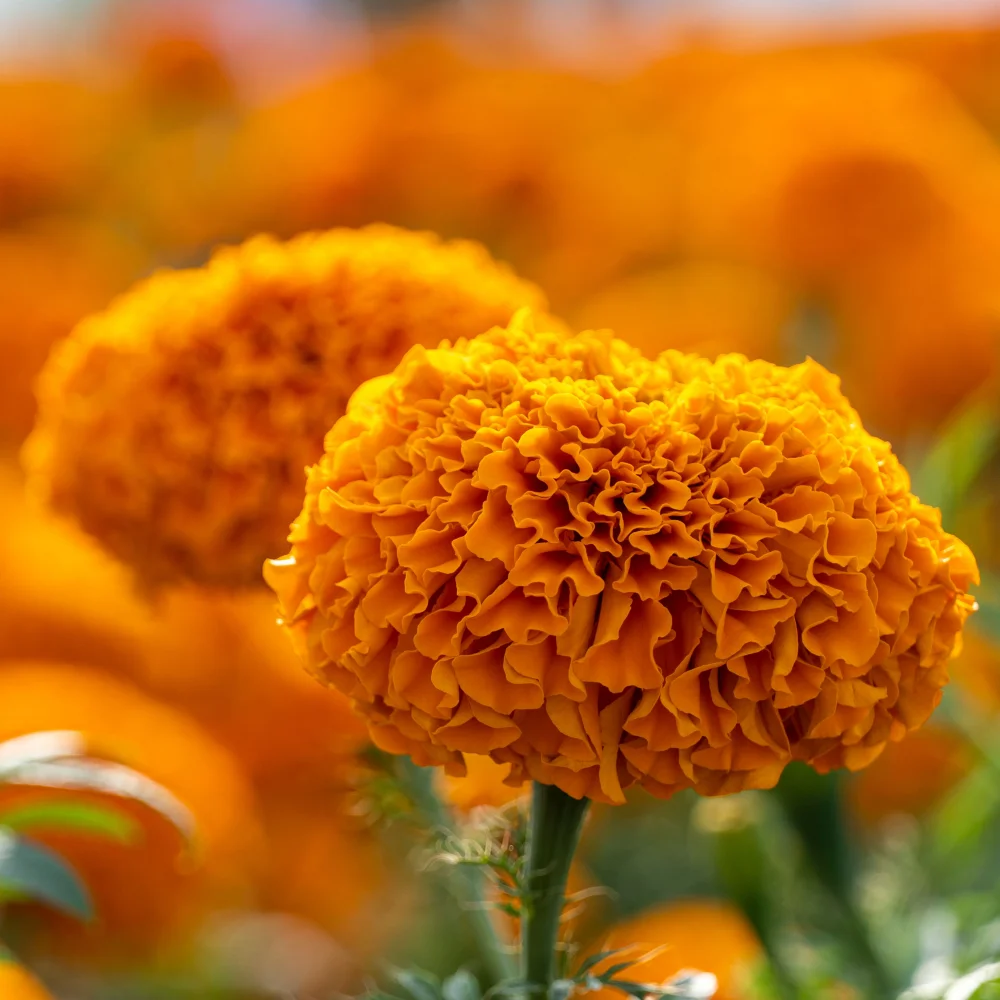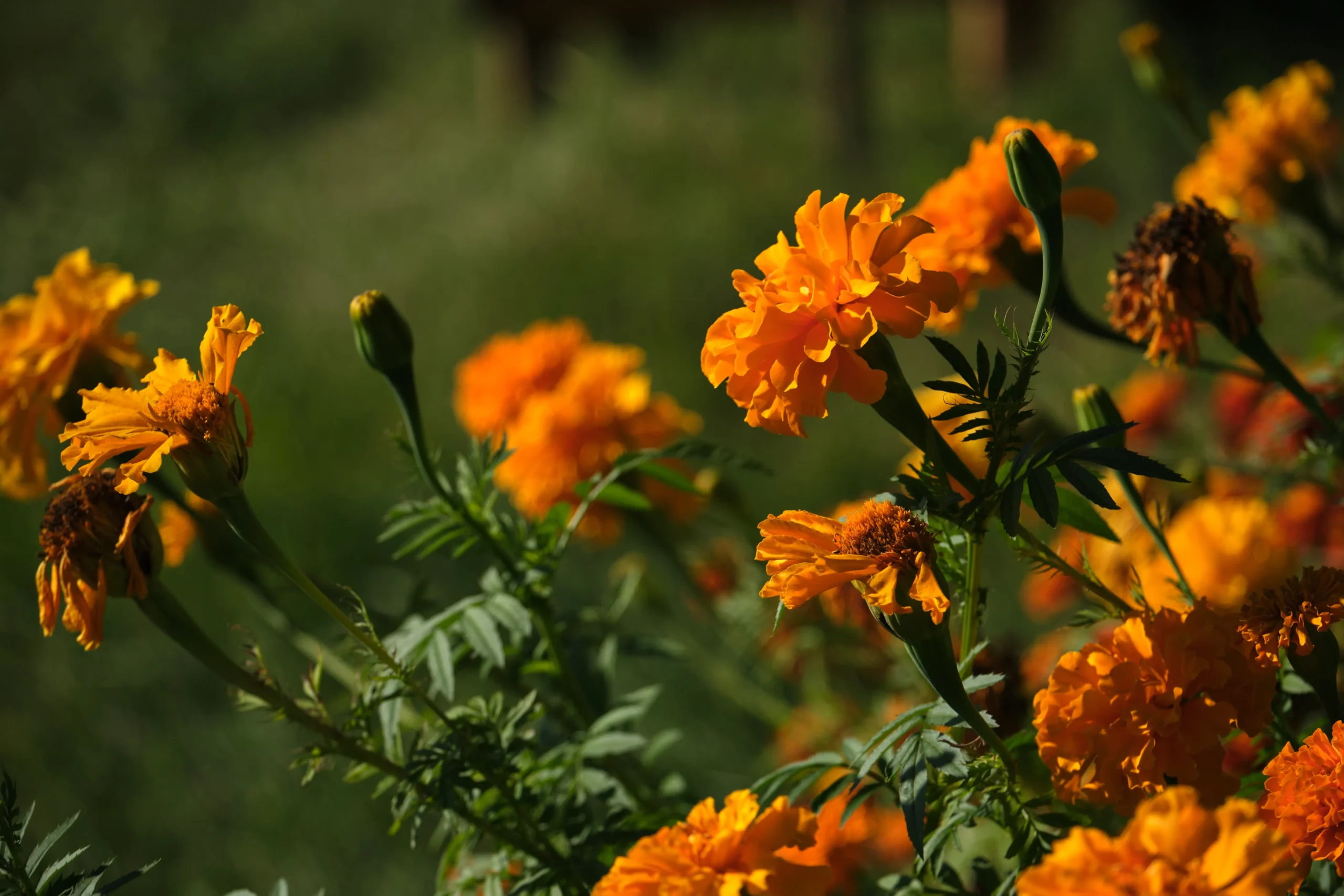Family: Marigold
Type: Annual
Other Common Name: African Marigold, Marigold

Deep Orange Marigold, known for its vibrant and cheerful blooms, is a favorite in gardens worldwide. These marigolds are celebrated for their rich, deep orange flowers that add a splash of color to any garden setting. Easy to grow and maintain, they are a popular choice for both novice and experienced gardeners.
Growing to about 10-12 inches in height, Deep Orange Marigolds are perfect for borders, containers, and as bedding plants. Their bold color and compact size make them ideal for creating eye-catching displays in various garden spaces. Marigolds are also known for their ability to deter pests, making them a practical addition to vegetable gardens and outdoor living areas.
Thriving in full sun, these marigolds prefer well-drained soil and regular watering. They are relatively drought-tolerant and can thrive in a range of soil types. Regular deadheading helps to encourage more blooms and extend the flowering season.Deep Orange Marigolds typically bloom from late spring until the first frost in the fall.
Hardiness Zone: 2a-11b
Deer Resistant: Yes
Moisture Preference: Moist
Sun Needs: Full sun
Drought Tolerance (Xeriscape): Yes
Growth Rate: Fast
Average Height (feet): 2
Average Spread (feet): 1
Average Life Span (years): 2
Form: Mounded
Flower Color: Orange
Bloom Season: From late spring to mid fall
Foliage Color: Green
Foliage Shape: Ferny
Deep Orange Marigolds are perfect for adding instant color and vibrancy to your garden. Plant them in clusters for a bold display or use them to edge garden beds and pathways. Their bright orange blooms create a stunning contrast against green foliage and other flowers.
Incorporate these marigolds into container gardens or hanging baskets. Their compact size and prolific blooming make them a great choice for adding color to patios, balconies, and porches. Deep Orange Marigolds are also excellent for companion planting in vegetable gardens, as they help repel certain pests.
Due to their bold color, these marigolds are great for creating focal points in the garden. Use them in combination with plants that have different textures or colors for a diverse and dynamic garden design.

In a cottage garden, Deep Orange Marigolds add a warm and inviting touch. Their bright blooms blend well with the informal and abundant plantings typical of this style.
For modern gardens, these marigolds bring a pop of color that contrasts beautifully with sleek, contemporary designs. They can be used to soften hard landscaping elements.
In Mediterranean gardens, Deep Orange Marigolds thrive in the typically sunny and dry conditions. Their color and form complement the relaxed and rustic aesthetic of this garden style.
Plant Deep Orange Marigolds in sunny spots where their vibrant color can be fully appreciated. Use them to attract beneficial insects and add cheerfulness to any garden setting.
Select our pre-made garden layouts to create a landscape that’s uniquely yours. Simple, smart, and customizable!
In spring, marigolds start growing, setting the stage for their summer bloom.
During summer, Deep Orange Marigolds are at their peak, showcasing a profusion of rich orange flowers that brighten the garden.
In the fall, marigolds continue to bloom until the first frost, adding color and interest to the autumn garden.
In winter, marigolds die back and can be cleared away, preparing the space for next year's growth.
Deep Orange Marigolds flourish in sunny areas that receive at least 6 hours of direct sunlight daily. They are ideal for flower beds, borders, and containers, adding a bright pop of color.
Full sun is essential for marigolds to bloom profusely. They thrive and produce the most vibrant flowers when planted in a location that receives ample sunlight.
Marigolds are not fussy about soil but prefer well-drained soil. They can tolerate a range of soil types, from clay to sandy soils.
Plant Deep Orange Marigolds about 8-10 inches apart. This spacing allows for adequate air circulation, which is crucial for preventing fungal diseases.
The best time to plant marigolds is after the danger of frost has passed in the spring. They can also be started indoors 6-8 weeks before the last frost date and transplanted outside.
Dig a hole slightly larger than the root ball. Place the marigold in the hole, fill it with soil, water well, and ensure it’s planted at the same depth it was in the pot.
Water marigolds regularly, allowing the soil to dry out slightly between waterings. Overwatering can lead to root rot.
Fertilize sparingly, as marigolds require minimal feeding. Too much fertilizer can reduce flowering.
Deadhead spent blooms regularly to encourage more flowering and maintain a neat appearance.
Plant marigolds after the last frost and water them regularly as they establish.
Continue regular watering and deadheading. Monitor for pests like aphids and treat if necessary.
Marigolds can continue to bloom until the first frost. Reduce watering as the weather cools.
In winter, marigolds are not frost-hardy and will die back. Remove dead plants and clear the area for spring planting.
Deep Orange Marigolds typically bloom from late spring until the first frost in the fall.
Yes, marigolds are excellent for companion planting as they help deter pests in vegetable gardens.
While marigolds prefer full sun, they can survive in partial shade, but their blooms may be less abundant.
Sign up below to get exclusive deals, discounts, and new plant collections—delivered straight to your inbox! Plus, stay inspired with the latest gardening tips, landscaping trends, and DIY garden ideas. Start growing with us today!
A big thank you for subscribing to the PBN Design newsletter.
We're thrilled to have you join our community. Get ready for exciting updates, insightful content, and more delivered straight to your inbox.
Stay tuned!
Go backA big thank you for subscribing to the PBN Design newsletter.
We're thrilled to have you join our community. Get ready for exciting updates, insightful content, and more delivered straight to your inbox.
Stay tuned!
Go back